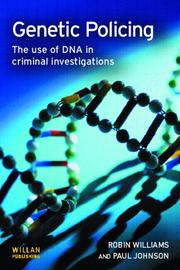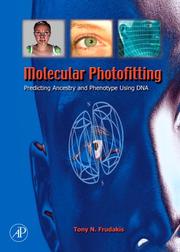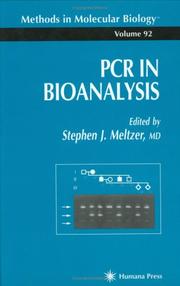| Listing 1 - 10 of 39 | << page >> |
Sort by
|

ISBN: 9781843922049 9781843922056 1843922053 1843922045 9781843925576 9781134005673 9781134005741 9781134005819 1134005679 Year: 2008 Publisher: Cullompton Willan
Abstract | Keywords | Export | Availability | Bookmark
 Loading...
Loading...Choose an application
- Reference Manager
- EndNote
- RefWorks (Direct export to RefWorks)
Criminal investigation --- DNA fingerprinting --- DNA fingerprints --- DNA identification --- DNA profiles --- DNA profiling --- Genetic fingerprinting --- Genetic fingerprints --- Forensic genetics --- Identification --- Technique
Book
ISBN: 0128125683 0128125020 9780128125687 9780128125021 Year: 2017 Publisher: London : Academic Press, an imprint of Elsevier,
Abstract | Keywords | Export | Availability | Bookmark
 Loading...
Loading...Choose an application
- Reference Manager
- EndNote
- RefWorks (Direct export to RefWorks)
It's in Your DNA: From Discovery to Structure, Function and Role in Evolution, Cancer and Aging describes, in a clear, approachable manner, the progression of the experiments that eventually led to our current understanding of DNA. This fascinating work tells the whole story from the discovery of DNA and its structure, how it replicates, codes for proteins, and our current ability to analyze and manipulate it in genetic engineering to begin to understand the central role of DNA in evolution, cancer, and aging. While telling the scientific story of DNA, this captivating treatise is further enhanced by brief sketches of the colorful lives and personalities of the key scientists and pioneers of DNA research. Major discoveries by Meischer, Darwin, and Mendel and their impacts are discussed, including the merging of the disciplines of genetics, evolutionary biology, and nucleic acid biochemistry, giving rise to molecular genetics. After tracing development of the gene concept, critical experiments are described and a new biological paradigm, the hologenome concept of evolution, is introduced and described. The final two chapters of the work focus on DNA as it relates to cancer and gerontology.--
DNA fingerprinting. --- DNA --- Analysis. --- DNA fingerprints --- DNA identification --- DNA profiles --- DNA profiling --- Genetic fingerprinting --- Genetic fingerprints --- Forensic genetics --- Identification --- Technique
Book
ISBN: 9780226498065 0226498069 9780226498072 9786612537974 1282537970 0226498085 0226498077 9780226498089 9781282537972 6612537973 Year: 2008 Publisher: Chicago University of Chicago press
Abstract | Keywords | Export | Availability | Bookmark
 Loading...
Loading...Choose an application
- Reference Manager
- EndNote
- RefWorks (Direct export to RefWorks)
DNA profiling-commonly known as DNA fingerprinting-is often heralded as unassailable criminal evidence, a veritable "truth machine" that can overturn convictions based on eyewitness testimony, confessions, and other forms of forensic evidence. But DNA evidence is far from infallible. Truth Machine traces the controversial history of DNA fingerprinting by looking at court cases in the United States and United Kingdom beginning in the mid-1980s, when the practice was invented, and continuing until the present. Ultimately, Truth Machine presents compelling evidence of the obstacles and opportunities at the intersection of science, technology, sociology, and law.
DNA fingerprinting --- History --- History. --- DNA fingerprints --- DNA identification --- DNA profiles --- DNA profiling --- Genetic fingerprinting --- Genetic fingerprints --- Forensic genetics --- Identification --- Technique --- DNA fingerprinting - History

ISBN: 1281038121 9786611038120 0080551378 0120884925 9780120884926 9780080551371 9781281038128 6611038124 Year: 2008 Publisher: Amsterdam Boston Elsevier/Academic Press
Abstract | Keywords | Export | Availability | Bookmark
 Loading...
Loading...Choose an application
- Reference Manager
- EndNote
- RefWorks (Direct export to RefWorks)
In the field of forensics, there is a critical need for genetic tests that can function in a predictive or inferential sense, before suspects have been identified, and/or for crimes for which DNA evidence exists but eye-witnesses do not. Molecular Photofitting fills this need by describing the process of generating a physical description of an individual from the analysis of his or her DNA. The molecular photofitting process has been used to assist with the identification of remains and to guide criminal investigations toward certain individuals within the sphere of prior suspects.
Forensic genetics. --- DNA fingerprinting. --- DNA fingerprints --- DNA identification --- DNA profiles --- DNA profiling --- Genetic fingerprinting --- Genetic fingerprints --- Forensic genetics --- Identification --- Forensic biology --- Genetics --- Medical jurisprudence --- Technique
Book
ISBN: 9782889192502 Year: 2014 Publisher: Frontiers Media SA
Abstract | Keywords | Export | Availability | Bookmark
 Loading...
Loading...Choose an application
- Reference Manager
- EndNote
- RefWorks (Direct export to RefWorks)
From ABO typing during the first half of the 20th century, to the use of enzymes and protein contained in blood serums and finally direct DNA typing, biology has been serving forensic purposes for many decades. Statistics, in turn, has been constantly underpinning the discussions of the probative value of results of biological analyses, in particular when defendants could not be considered as excluded as potential sources because of different genetic traits. The marriage between genetics and statistics has never been an easy one, though, as is illustrated by fierce arguments that peaked in the so-called "DNA wars" in some American courtrooms in the mid-1990s. This controversy has contributed to a lively production of research and publications on various interpretative topics, such as the collection of relevant data, foundations in population genetics as well as theoretical and practical considerations in probability and statistics. Both DNA profiling as a technique and the associated statistical considerations are now widely accepted as robust, but this does not yet guarantee or imply a neat transition to their application in court. Indeed, statistical principles applied to results of forensic DNA profiling analyses are a necessary, yet not a sufficient preliminary requirement for the contextually meaningful use of DNA in the law. Ultimately, the appropriate use of DNA in the forensic context relies on inference, i.e. reasoning reasonably in the face of uncertainty. This is all the more challenging that such thought processes need to be adopted by stakeholders from various backgrounds and holding diverse interests. Although several topics of the DNA controversy have been settled over time, some others are still debated (such as the question of how to deal with the probability of error), while yet others - purportedly settled topics - saw some recent revivals (e.g., the question of how to deal with database searches). In addition, new challenging topics have emerged over the last decade, such as the analysis and interpretation of traces containing only low quantities of DNA where artefacts of varying nature may affect results. Both technical and interpretative research involving statistics thus represent areas where ongoing research is necessary, and where scholars from the natural sciences and the law should collaborate. The articles in this Research Topic thus aim to investigate, from an interdisciplinary perspective, the current understanding of the strengths and limitations of DNA profiling results in legal applications. This Research Topic accepts contributions in all frontiers article type categories and places an emphasis on topics with a multidisciplinary perspective that explore (while not being limited to) statistical genetics for forensic scientists, case studies and reports, evaluation and interpretation of forensic findings, communication of expert findings to laypersons, quantitative legal reasoning and fact-finding using probability.
Biology - General --- Biology --- Health & Biological Sciences --- probability theory --- interpretation --- Bacterial DNA --- Statistics and the law --- Forensic DNA profiling --- Low-template DNA analysis --- Commercialization --- DNA transfer --- forensic molecular biology
Book
ISBN: 0128205687 0128205628 9780128205686 9780128205624 Year: 2020 Publisher: London Academic Press
Abstract | Keywords | Export | Availability | Bookmark
 Loading...
Loading...Choose an application
- Reference Manager
- EndNote
- RefWorks (Direct export to RefWorks)
DNA fingerprinting. --- Forensic genetics. --- Forensic biology --- Genetics --- Medical jurisprudence --- DNA fingerprints --- DNA identification --- DNA profiles --- DNA profiling --- Genetic fingerprinting --- Genetic fingerprints --- Forensic genetics --- Identification --- Technique
Book
ISBN: 1108138306 1108139035 1108139159 1108139272 1316417115 1108139876 1108139396 1107129966 1107570468 9781108139878 1108139752 9781108139755 9781316417119 9781107129962 9781107570467 Year: 2017 Publisher: Cambridge
Abstract | Keywords | Export | Availability | Bookmark
 Loading...
Loading...Choose an application
- Reference Manager
- EndNote
- RefWorks (Direct export to RefWorks)
For centuries, most people believed the criminal justice system worked - that only guilty defendants were convicted. DNA technology shattered that belief. DNA has now freed more than three hundred innocent prisoners in the United States. This book examines the lessons learned from twenty-five years of DNA exonerations and identifies lingering challenges. By studying the dataset of DNA exonerations, we know that precise factors lead to wrongful convictions. These include eyewitness misidentifications, false confessions, dishonest informants, poor defense lawyering, weak forensic evidence, and prosecutorial misconduct. In Part I, scholars discuss the efforts of the Innocence Movement over the past quarter century to expose the phenomenon of wrongful convictions and to implement lasting reforms. In Part II, another set of researchers looks ahead and evaluates what still needs to be done to realize the ideal of a more accurate system.
Judicial error --- Criminal justice, Administration of --- DNA fingerprinting --- DNA fingerprints --- DNA identification --- DNA profiles --- DNA profiling --- Genetic fingerprinting --- Genetic fingerprints --- Forensic genetics --- Identification --- Law and legislation --- Technique
Book
ISBN: 9811643180 Year: 2022 Publisher: Gateway East, Singapore : Springer,
Abstract | Keywords | Export | Availability | Bookmark
 Loading...
Loading...Choose an application
- Reference Manager
- EndNote
- RefWorks (Direct export to RefWorks)
This reference book comprehensively reviews the significance of DNA technology in forensic science. After presenting the theory, basic principles, tools and techniques that are used in forensic DNA typing, it summarizes various techniques, including autosomal STR, Y-STR, X-STR, mitochondrial DNA and NGS, used in solving both criminal as and civil cases, such as paternity disputes, identification of mutilated remains, and culprit identification in sexual assault and murder cases. It also provides an overview of DNA-based genetic diagnostics for various diseases, and discusses the role of DNA typing in drug reactions, as well as the application of non-human DNA profiling of animals and plants in forensic science investigations. Lastly, the book examines the role of internal quality control in maintaining the high quality of DNA profiling.
DNA fingerprinting --- DNA fingerprinting. --- Technique. --- DNA fingerprints --- DNA identification --- DNA profiles --- DNA profiling --- Genetic fingerprinting --- Genetic fingerprints --- Forensic genetics --- Identification --- Technique --- Ressenya genètica
Book
ISBN: 1283238489 9786613238481 0123878233 0123745136 Year: 2012 Publisher: Amsterdam ; Boston : Academic Press,
Abstract | Keywords | Export | Availability | Bookmark
 Loading...
Loading...Choose an application
- Reference Manager
- EndNote
- RefWorks (Direct export to RefWorks)
Intended as a companion to the Fundamentals of Forensic DNA Typing volume published in 2009, Advanced Topics in Forensic DNA Typing: Methodology contains 18 chapters with 4 appendices providing up-to-date coverage of essential topics in this important field and citation to more than 2800 articles and internet resources. The book builds upon the previous two editions of John Butler’s internationally acclaimed Forensic DNA Typing textbook with forensic DNA analysts as its primary audience. This book provides the most detailed information written to-date on DNA databases, low-level DNA, validation, and numerous other topics including a new chapter on legal aspects of DNA testing to prepare scientists for expert witness testimony. Over half of the content is new compared to previous editions. A forthcoming companion volume will cover interpretation issues.
DNA fingerprinting. --- Forensic genetics. --- DNA fingerprints --- DNA identification --- DNA profiles --- DNA profiling --- Genetic fingerprinting --- Genetic fingerprints --- Forensic biology --- Genetics --- Medical jurisprudence --- Forensic genetics --- Identification --- Technique --- DNA Fingerprinting --- DNA --- Forensic Genetics --- methods --- physiology

ISBN: 0896034976 1592595758 Year: 1998 Publisher: Totowa, NJ : Humana Press : Imprint: Humana,
Abstract | Keywords | Export | Availability | Bookmark
 Loading...
Loading...Choose an application
- Reference Manager
- EndNote
- RefWorks (Direct export to RefWorks)
Polymerase chain reaction --- Molecular diagnosis --- DNA fingerprinting --- DNA fingerprints --- DNA identification --- DNA profiles --- DNA profiling --- Genetic fingerprinting --- Genetic fingerprints --- Diagnosis --- Molecular diagnostics --- Molecular aspects --- Forensic genetics --- Identification --- Molecular biology --- Technique --- Cytology. --- Cell Biology. --- Cell biology --- Cellular biology --- Biology --- Cells --- Cytologists
| Listing 1 - 10 of 39 | << page >> |
Sort by
|

 Search
Search Feedback
Feedback About UniCat
About UniCat  Help
Help News
News